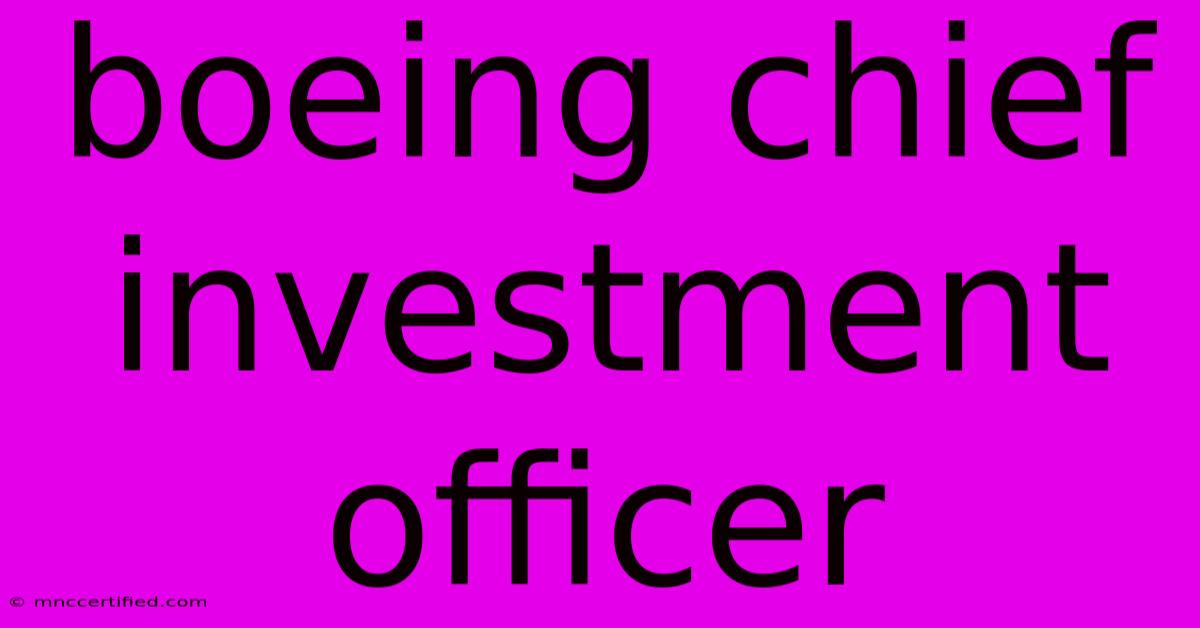Boeing Chief Investment Officer

Table of Contents
Decoding the Role of Boeing's Chief Investment Officer
Boeing, a global aerospace giant, requires intricate financial maneuvering to navigate its complex operations. At the helm of this financial strategy sits the Chief Investment Officer (CIO). This role is crucial, impacting everything from long-term growth initiatives to managing risk and ensuring optimal capital allocation. Understanding the responsibilities and influence of Boeing's CIO is key to comprehending the company's overall financial health and future trajectory. This article delves into the intricacies of this critical position.
The Responsibilities of Boeing's CIO
The Boeing CIO's responsibilities are multifaceted and demanding, encompassing several key areas:
Investment Strategy & Portfolio Management:
- Long-term Vision: The CIO is responsible for developing and implementing a long-term investment strategy aligned with Boeing's overall business objectives. This involves analyzing market trends, identifying investment opportunities (both organic growth and acquisitions), and mitigating potential risks. This requires a deep understanding of the aerospace industry, global economics, and financial markets.
- Portfolio Diversification: Managing a diverse investment portfolio is paramount. The CIO ensures that Boeing's investments are spread across various asset classes to minimize risk and maximize returns. This might include investments in research and development, new technologies, infrastructure projects, and strategic acquisitions.
- Performance Monitoring & Reporting: Regularly monitoring the performance of the investment portfolio is essential. The CIO provides regular reports to senior management, highlighting key performance indicators (KPIs) and recommending necessary adjustments to the investment strategy.
Risk Management & Compliance:
- Identifying & Mitigating Risks: A significant part of the CIO's role involves proactively identifying and mitigating potential financial risks. This includes assessing market volatility, geopolitical uncertainties, and regulatory changes that could impact Boeing's investments.
- Regulatory Compliance: Ensuring adherence to all relevant financial regulations and compliance standards is critical. The CIO plays a crucial role in maintaining transparency and accountability in all investment activities.
Financial Planning & Analysis:
- Capital Allocation: The CIO plays a key role in determining how Boeing allocates its capital resources across various projects and initiatives. This requires careful analysis of potential returns, risks, and alignment with the company's strategic goals.
- Financial Modeling & Forecasting: Developing accurate financial models and forecasts is essential for effective investment decision-making. The CIO leverages advanced analytical techniques to predict future financial performance and inform investment strategies.
The Impact on Boeing's Future
The decisions made by Boeing's CIO have a profound impact on the company's future. Effective investment strategies are crucial for:
- Driving Growth: Strategic investments in research and development, new technologies, and acquisitions fuel Boeing's growth and competitiveness in the aerospace market.
- Enhancing Shareholder Value: Sound financial management and prudent investment decisions ultimately increase shareholder value by maximizing returns and minimizing risk.
- Maintaining Financial Stability: The CIO's role in managing risk and ensuring financial stability is crucial for weathering economic downturns and navigating challenging market conditions.
Finding Information on the Current CIO
While specific details about the current Boeing CIO's strategies and activities are often kept internal for competitive reasons, information can often be gleaned from:
- Boeing's Investor Relations Website: This is the primary source for financial information, including annual reports, SEC filings, and press releases that might indirectly mention investment strategies.
- Financial News Outlets: Major business news sources frequently report on Boeing's financial performance and strategic decisions, which might shed light on the CIO's influence.
- Industry Publications: Specialized aerospace and financial publications often publish analyses and insights into Boeing's financial strategies.
In conclusion, the role of Boeing's Chief Investment Officer is vital to the company's success. Their strategic decisions regarding investment, risk management, and financial planning directly impact Boeing's growth, stability, and ultimately, its long-term future. While specific details about the individual holding this position and their precise activities remain confidential, understanding the scope of their responsibilities provides valuable insight into the dynamics of this global aerospace giant.

Thank you for visiting our website wich cover about Boeing Chief Investment Officer. We hope the information provided has been useful to you. Feel free to contact us if you have any questions or need further assistance. See you next time and dont miss to bookmark.
Featured Posts
-
Canada To Egypt Nile Cruise Adventure
Nov 26, 2024
-
Texas Real Estate E And O Insurance
Nov 26, 2024
-
Foxen Renters Insurance Reviews
Nov 26, 2024
-
Roe Henderson Shelter Insurance
Nov 26, 2024
-
Microsoft Recovering From Recent Outage
Nov 26, 2024